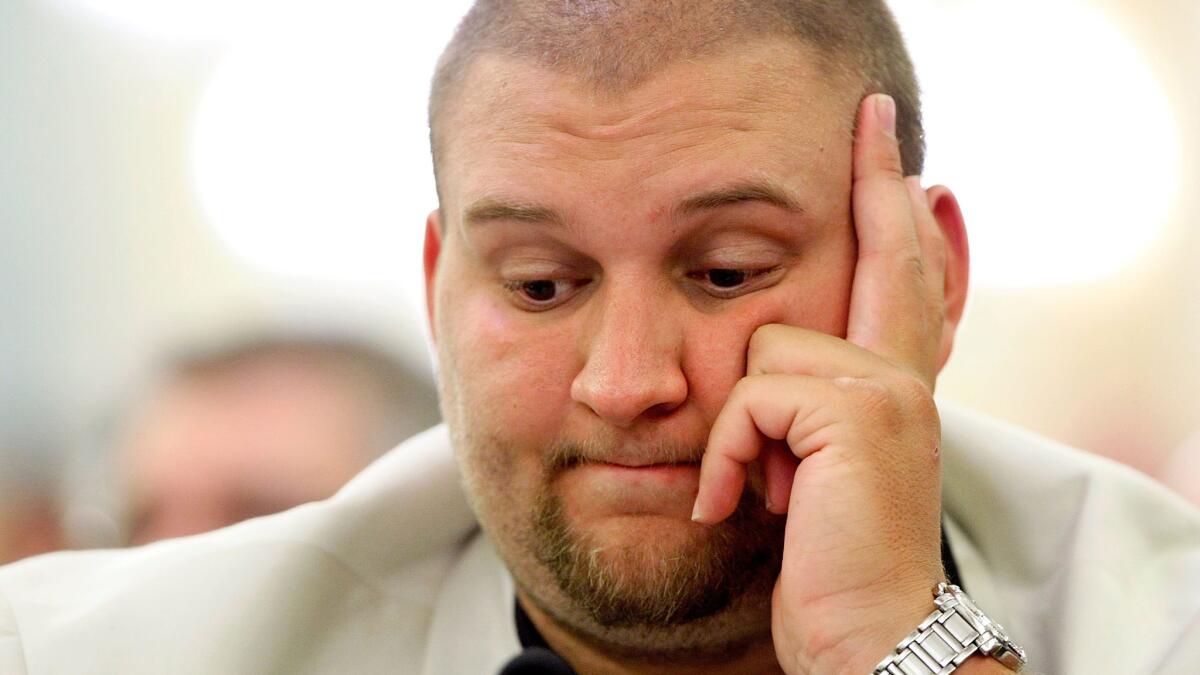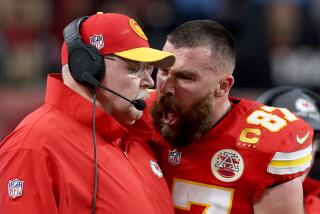Son of former player is not impressed by NFL acknowledgment of CTE link

Garrett Webster, son of Pro Football Hall of Famer Mike Webster, listens to testimony during a Sept. 18, 2007, hearing on Capitol Hill focusing on the compensation system for NFL retirees suffering from permanent injuries.
- Share via
The son of the first retired NFL player diagnosed with chronic traumatic encephalopathy, or CTE, was not impressed Monday that the league finally acknowledged a link between football and the degenerative brain disease.
“It’s disgusting it’s taken them this long to admit anything,” Garrett Webster wrote in an email to The Times. His father, Mike Webster, was a Hall of Fame center for the Pittsburgh Steelers who suffered from dementia after his football career, was frequently homeless, and died in 2002 of undisclosed causes at age 50.
The NFL has long been careful about making a definitive connection between brain trauma and CTE, but during a round-table discussion on concussions Monday, Jeff Miller, the league’s senior vice president for health and safety, was asked if such a link had been established.
“The answer to that question is certainly yes,” Miller said, adding, “But there’s also a number of questions that come with that.”
The younger Webster said he expects the league to “trumpet the announcement like they are taking progressive steps” but “then they will ignore it for a few months again and hope the problem goes away and dies like so many ex-players.”
Webster learned about the development in a Facebook message from his mother.
“My first reaction was just wanting to vomit,” Webster said, “that it took them 10 years to admit it and that they will now play it off like they did everyone a favor by admitting it.”
See more of our top stories on Facebook >>
Dr. Ann McKee, a neuropathologist, leads a Boston-based group that has diagnosed CTE in 176 former athletes, 141 of whom were football players -- with evidence of the disease showing up in 90 of 94 brains of former NFL players, 45 of 55 former college players, and six of 26 people who didn’t play football past high school.
Chris Nowinski, executive director of the Concussion Legacy Foundation said the NFL “has always avoided the specific question of CTE. I’ve always assumed that the NFL recruited the only doctors who are still not yet convinced, and they were going to wait until the lawsuit was signed off until they acknowledged this very obvious connection.”
A year ago, a federal judge granted final approval to a settlement in the long-running concussion litigation against the league by retired players. That deal, which compensates some players suffering from a variety of conditions, is on hold pending the outcome of an appeal.
Get the latest in sports with our free newsletter >>
Two attorneys involved in the litigation against the NFL said they don’t think that Monday’s development will have any effect on the settlement with retired players.
Nowinski said he has no idea how the latest acknowledgment could affect the settlement, if at all, but added that now that the NFL has conceded there’s a link between brain injuries and CTE, “this will be cited by lawyers until the end of time.”
On Tuesday, George Cochran, the attorney for Curtis Anderson, another retired player appealing the settlement, filed a letter with the court asking that players diagnosed with CTE in the future not be bound by terms of the deal.
ALSO
Watch Raptors fan Drake help force the Bulls into a five-second violation
Giants pitcher Johnny Cueto stays in the game after line drive hits him in the head
NFL executive’s CTE comment ‘directly contradicts’ court filings, says lawyer for retired players
More to Read
Go beyond the scoreboard
Get the latest on L.A.'s teams in the daily Sports Report newsletter.
You may occasionally receive promotional content from the Los Angeles Times.












